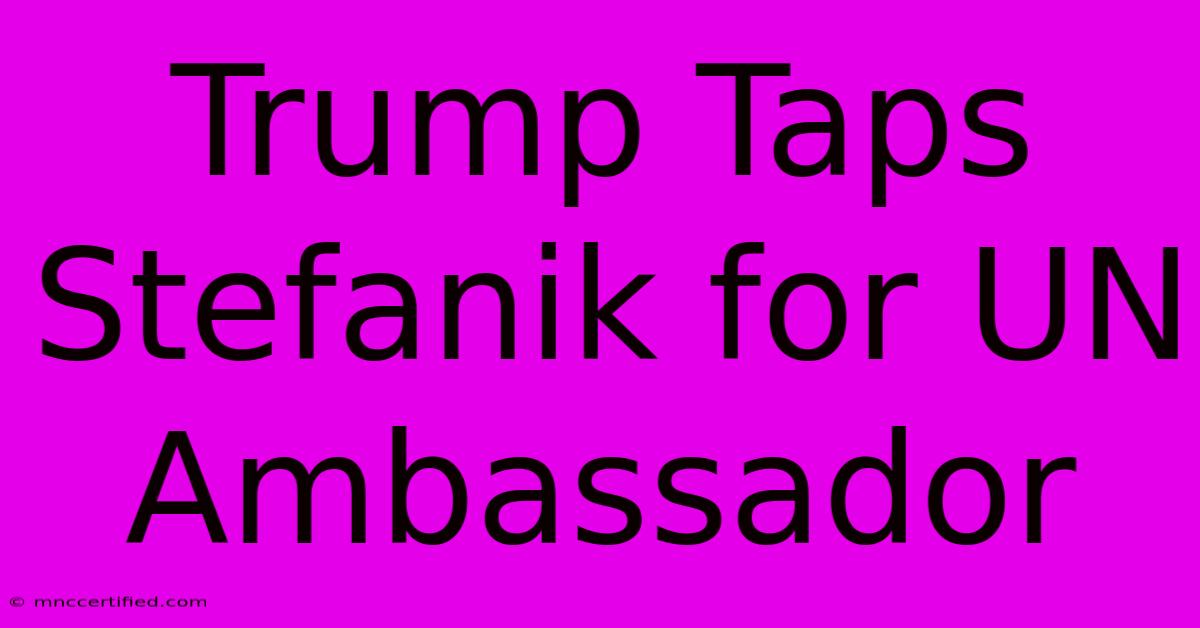Trump Taps Stefanik For UN Ambassador

Table of Contents
Trump Taps Elise Stefanik for UN Ambassador: A Controversial Choice
Former President Donald Trump's decision to nominate Rep. Elise Stefanik (R-NY) as the U.S. Ambassador to the United Nations has sparked intense debate. While some view it as a strategic move to solidify his presence on the world stage, others criticize the choice as politically motivated and lacking in diplomatic experience. This article delves into the potential implications of Stefanik's nomination, analyzing her qualifications, the political landscape surrounding the appointment, and the likely challenges she faces if confirmed.
Stefanik's Background: From Rising Star to Political Firebrand
Elise Stefanik, at 38, has already made a significant mark on American politics. Elected to Congress in 2014, she quickly rose through the ranks, becoming the youngest woman to serve as a Republican conference chair. Initially known for her moderate views and bipartisan approach, she shifted significantly to the right following the 2020 election, becoming a staunch defender of Trump's unfounded claims of election fraud. This shift cemented her position as a prominent voice within the Republican Party, earning her Trump's favor and ultimately leading to this nomination.
Qualifications and Criticisms: A Balancing Act
Stefanik's supporters highlight her political savvy, her ability to connect with voters, and her strong advocacy for American interests on the world stage. However, critics point to her lack of diplomatic experience, arguing that her political background and her controversial stance on issues like election integrity make her unqualified for a role that requires navigating complex international relations. The lack of experience in foreign policy, combined with her outspoken nature, raises concerns about her ability to effectively represent the United States in the UN.
Political Landscape and the Road Ahead
The nomination comes at a crucial time in international politics, with the United States facing mounting global challenges. The ongoing conflict in Ukraine, the rise of China, and the need for international cooperation on issues like climate change present a complex and demanding landscape for the next UN ambassador. Stefanik's nomination is likely to be met with fierce opposition from Democrats, raising questions about her confirmation prospects. However, Republicans, with their current control of the House, may be able to steer the nomination process.
The Future of the UN Ambassador Role
Regardless of the outcome, the nomination of Elise Stefanik signifies the increasing politicization of the UN ambassador role. This appointment, fueled by loyalty to Trump and driven by partisan agendas, raises concerns about whether the position will continue to be filled based on merit and diplomatic experience. The coming weeks and months will be crucial in determining how this nomination will shape the future of the U.S. presence in the UN and the broader landscape of international diplomacy.
Keywords:
- Elise Stefanik
- UN Ambassador
- Donald Trump
- Nomination
- Foreign Policy
- Diplomacy
- Republican Party
- Political Landscape
- Confirmation
- International Relations
- Ukraine
- China
- Climate Change

Thank you for visiting our website wich cover about Trump Taps Stefanik For UN Ambassador. We hope the information provided has been useful to you. Feel free to contact us if you have any questions or need further assistance. See you next time and dont miss to bookmark.
Featured Posts
-
Luxembourg Citizenship By Investment
Nov 12, 2024
-
Justin Welby Resignation Calls Rise Over Issue
Nov 12, 2024
-
Selena Gomezs Romantic Botanical Garden Date Revealed
Nov 12, 2024
-
Veterans Day Whats Open And Closed
Nov 12, 2024
-
Monday Picks Dolphins Rams Nhl College Basketball
Nov 12, 2024